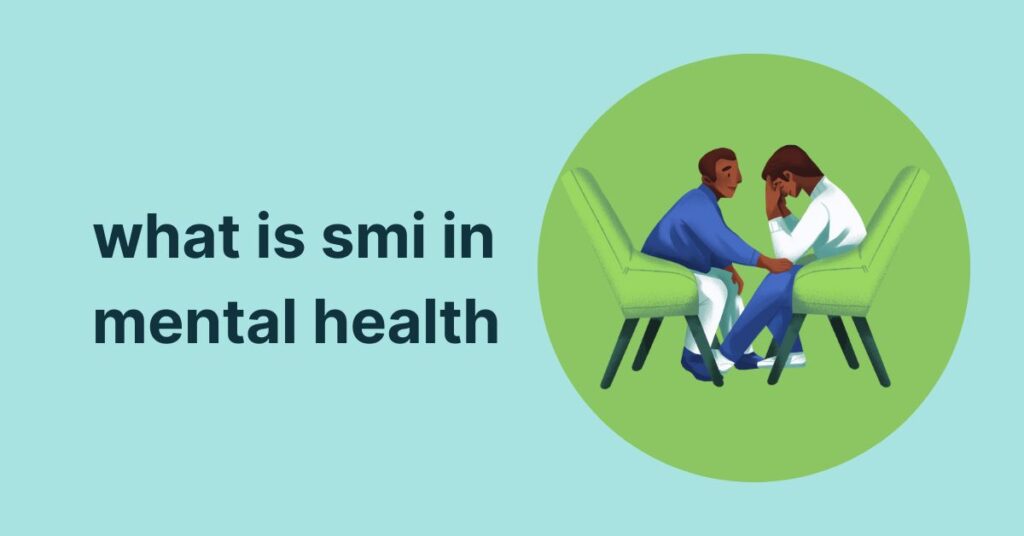Serious Mental Illness (SMI) affects many people worldwide. It includes conditions like schizophrenia, bipolar disorder, and severe depression.
Understanding SMI is crucial for better mental health care. Many suffer in silence, not knowing their condition is treatable. SMI can impact daily life, making it hard to work, study, or maintain relationships. Recognizing the signs and seeking help early can make a big difference.
This blog explores what SMI is, its symptoms, and treatment options. Let’s dive into the world of SMI to better understand and support those affected.
Topic of Contents
ToggleIntroduction To Severe Mental Illness
Severe Mental Illness (SMI) affects many people worldwide. It impacts daily life and overall well-being. Understanding SMI can help reduce stigma and provide support.
Definition Of Smi
SMI refers to mental health conditions that are serious and persistent. These conditions often require long-term treatment. Examples include schizophrenia, bipolar disorder, and severe depression.
These illnesses can disrupt a person’s ability to function. They may affect work, school, and relationships. People with SMI need ongoing care and support.
Importance Of Awareness
Raising awareness about SMI is crucial. It helps people understand the challenges faced by those affected. Awareness can lead to better support systems and resources.
Educating the public reduces stigma. It encourages empathy and understanding. This can improve the lives of those living with SMI.
Awareness also promotes early intervention. Early treatment can prevent the condition from worsening. This can make a significant difference in recovery.

Types Of Severe Mental Illness
Severe Mental Illness (SMI) covers a range of disorders. These disorders impact daily life significantly. Understanding the types of SMI is crucial. Each disorder has unique symptoms and treatment options. Let’s explore three common types of Severe Mental Illness.
Schizophrenia
Schizophrenia is a chronic brain disorder. It affects how a person thinks, feels, and behaves. People with schizophrenia may seem disconnected from reality. Symptoms include hallucinations, delusions, and disorganized thinking. Treatment usually involves medication and therapy. Early diagnosis can improve outcomes.
Bipolar Disorder
Bipolar Disorder involves extreme mood swings. These swings range from mania to depression. During mania, individuals feel extremely energetic and happy. In depressive episodes, they feel very sad and hopeless. Treatment includes mood stabilizers and psychotherapy. Managing stress and sleep is also important.
Major Depressive Disorder
Major Depressive Disorder (MDD) is a serious mood disorder. It causes persistent feelings of sadness and loss of interest. People with MDD struggle with daily activities. Symptoms include fatigue, changes in appetite, and thoughts of death. Treatment often includes antidepressants and counseling. Support from loved ones is vital.
Symptoms And Diagnosis
Understanding the symptoms and diagnosis of Serious Mental Illness (SMI) can help in managing the condition effectively. Knowing the signs early can lead to better treatment and support. Below, we dive into the common symptoms, diagnostic criteria, and early warning signs of SMI.
Common Symptoms
People with SMI often show a range of symptoms. These can vary widely. Some common symptoms include severe mood swings, intense sadness, and extreme anxiety. They may also experience hallucinations or delusions. Trouble focusing and making decisions is also common. These symptoms can disrupt daily life and relationships.
Diagnostic Criteria
Doctors use specific criteria to diagnose SMI. These criteria help identify the condition accurately. They look at the duration and severity of symptoms. A key factor is how much these symptoms affect daily functioning. Diagnostic tools like interviews and questionnaires help in the process.
Criteria include persistent feelings of sadness or hopelessness. Other criteria are extreme highs and lows in mood. The presence of psychotic symptoms like hallucinations is also considered. A comprehensive evaluation is crucial for an accurate diagnosis.
Early Warning Signs
Recognizing early warning signs can help in seeking timely help. Early signs often include changes in sleep patterns. Notice if someone is sleeping too much or too little. Sudden mood changes and withdrawal from social activities are also signs. Difficulty concentrating or a drop in performance at work or school should not be ignored.
Other early signs include unexplained physical ailments. These can be headaches or stomachaches. Increased use of substances like alcohol can also be a red flag. Paying attention to these signs can lead to early intervention and better outcomes.
Causes And Risk Factors
Serious Mental Illness (SMI) is a complex issue. It arises from various causes and risk factors. Understanding these elements can help in managing and preventing SMI.
Genetic Factors
Genetics play a significant role in SMI. Studies show that mental illnesses can run in families. If a close relative has an SMI, your risk increases. This suggests a strong genetic link.
Researchers have identified specific genes associated with SMI. These genes affect brain function and structure. They can make someone more vulnerable to mental illnesses. But having these genes does not mean you will definitely develop an SMI. Other factors also play a role.
Environmental Influences
Environmental influences are crucial in SMI development. A stressful or traumatic event can trigger mental illnesses. Examples include abuse, neglect, or loss of a loved one.
Other environmental factors include:
- Poor living conditions
- Lack of social support
- Exposure to violence
These situations can increase the risk of developing an SMI.
Psychological Factors
Psychological factors also contribute to SMI. These include personality traits and coping mechanisms. People with low self-esteem or poor stress management are at higher risk.
Psychological trauma can leave lasting impacts. Childhood trauma, in particular, is linked to SMI. It can affect how the brain develops and functions. This increases the likelihood of mental health issues later in life.
| Factor | Examples |
|---|---|
| Genetic | Family history, specific genes |
| Environmental | Stressful events, poor living conditions, violence |
| Psychological | Low self-esteem, poor stress management, childhood trauma |
Impact On Daily Life
Serious Mental Illness (SMI) can have a profound impact on daily life. It affects various aspects of a person’s existence, making even simple tasks challenging. Understanding these impacts can foster empathy and support for those affected.
Personal Relationships
SMI can strain personal relationships. Individuals may struggle with communication and emotional expression. This can lead to misunderstandings and conflicts. Family members and friends might find it hard to understand the behavior of someone with SMI. This can result in feelings of isolation for the affected person.
Trust issues can also arise. Erratic behavior or mood swings can make it difficult to maintain stable relationships. Support from loved ones is crucial but can be hard to sustain without proper understanding and patience.
Employment Challenges
Employment can be particularly challenging for individuals with SMI. They may face difficulties in securing and maintaining a job. Symptoms such as anxiety, depression, or hallucinations can interfere with work performance.
Employers might not always understand the needs of employees with SMI. This can lead to discrimination or lack of necessary accommodations. The stress of managing SMI symptoms while trying to meet job expectations can be overwhelming.
| Challenge | Impact |
|---|---|
| Securing a Job | Difficult due to stigma and discrimination |
| Maintaining Employment | Hard to manage symptoms and job tasks |
| Performance | Impaired by anxiety, depression, or other symptoms |
Quality Of Life
SMI can significantly affect the overall quality of life. Daily activities that most take for granted can become monumental tasks. Self-care, such as personal hygiene and healthy eating, may be neglected. This can lead to further physical health problems.
Recreational activities and hobbies might be abandoned. The lack of engagement can lead to a sense of purposelessness. Social withdrawal is common, reducing opportunities for enjoyment and connection.
- Difficulty in daily self-care
- Neglect of physical health
- Loss of interest in hobbies
- Social withdrawal
Improving the quality of life for those with SMI involves comprehensive support. This includes medical, emotional, and social assistance.
Treatment Options
Serious Mental Illness (SMI) affects many people worldwide. Treatment options can help manage symptoms and improve quality of life. Effective treatment often includes a combination of medication, psychotherapy, and support groups.
Medication
Medication can play a crucial role in managing SMI. It helps to control symptoms and stabilize mood. Common medications include antidepressants, antipsychotics, and mood stabilizers. A healthcare provider can help determine the right medication.
It’s important to follow the prescribed dosage. Regular check-ups ensure the medication works as intended. Side effects should be reported to a doctor immediately.
Psychotherapy
Psychotherapy, or talk therapy, helps people with SMI understand their thoughts and feelings. It provides a safe space to discuss personal issues. Cognitive Behavioral Therapy (CBT) is a popular method. It focuses on changing negative thought patterns.
Therapists guide patients through coping strategies. These strategies can reduce the impact of symptoms. Therapy sessions may be one-on-one or in a group setting. Consistency is key for effective results.
Support Groups
Support groups offer a community for people with SMI. They provide a platform to share experiences and advice. Feeling understood and supported can be incredibly beneficial. These groups are often led by trained facilitators.
Regular meetings help build a sense of belonging. Many find comfort in knowing they are not alone. Support groups can be found both in-person and online.
Coping Strategies
Living with a Serious Mental Illness (SMI) can be overwhelming. Effective coping strategies can make daily life more manageable. This section covers key approaches to coping with SMI.
Self-care Practices
Self-care involves activities that improve mental, emotional, and physical well-being. Regular exercise can uplift your mood. Eating healthy meals can stabilize your energy. Getting enough sleep helps your mind and body recover. Mindfulness and meditation can reduce anxiety. These practices build resilience and help you feel better.
Building A Support Network
A strong support network provides emotional and practical help. Friends and family can offer understanding and companionship. Support groups connect you with others facing similar challenges. Professional help, like therapists, provides expert guidance. Sharing your experiences can reduce feelings of isolation. Having people to rely on can make a big difference.
Stress Management
Stress can worsen mental health symptoms. Learning to manage stress is crucial. Deep breathing exercises can calm your mind. Engaging in hobbies can distract you from worries. Time management helps you avoid feeling overwhelmed. Setting realistic goals keeps stress in check. Knowing how to relax is an important skill.
Support For Families And Caregivers
Supporting a loved one with Serious Mental Illness (SMI) can be challenging. Families and caregivers play a crucial role in the recovery process. They need tools and resources to help them manage their responsibilities effectively.
Educational Resources
Understanding SMI is the first step in providing support. Various educational resources are available to help families and caregivers learn more about SMI.
- Online courses on mental health
- Books and articles on coping strategies
- Webinars and workshops by mental health professionals
Support Services
Support services offer practical help and emotional support for caregivers. These services can make a significant difference in their lives.
| Service | Description |
|---|---|
| Support Groups | Meet with others facing similar challenges. |
| Respite Care | Temporary relief from caregiving duties. |
| Professional Counseling | Access to mental health professionals for guidance. |
Caregiver Self-care
Caregivers often neglect their own well-being. Self-care is essential to maintain their health and effectiveness.
- Regular Exercise: Keeps the body and mind healthy.
- Healthy Diet: Provides necessary nutrients and energy.
- Mindfulness Practices: Helps manage stress.
Taking care of oneself is not a luxury. It is a necessity for providing ongoing support to loved ones with SMI.
Advocacy And Policy
Advocacy and policy play a crucial role in shaping the mental health landscape, especially for those with Serious Mental Illness (SMI). By understanding and influencing legislation, advocacy groups, and future directions, we can support better mental health outcomes.
Mental Health Legislation
Effective mental health legislation is essential for protecting the rights of individuals with SMI. It ensures they receive the care and support they need. Policies like the Mental Health Parity Act mandate equal coverage for mental health and physical health services. This legislation helps reduce stigma and promotes fair treatment.
Governments must regularly update and enforce these laws. This ensures that people with SMI have access to the latest treatments and support systems. Legislation also helps address issues like discrimination in the workplace and housing.
Role Of Advocacy Groups
Advocacy groups are vital in raising awareness and pushing for better policies. Organizations like the National Alliance on Mental Illness (NAMI) provide resources, support, and education. They also lobby for changes in mental health policy.
Advocacy groups work at local, state, and national levels. They organize events, campaigns, and fundraisers to support their cause. These groups also offer support networks for individuals and families affected by SMI.
Future Directions
The future of mental health advocacy and policy looks promising. Emerging technologies and research offer new ways to support individuals with SMI. Telehealth services are becoming more accessible, providing remote care options.
Policymakers are focusing on integrating mental health services into primary care. This approach ensures holistic treatment and reduces the stigma associated with seeking help. Future policies aim to increase funding for mental health research and services.
Community-based initiatives are also gaining traction. These programs focus on early intervention and support for individuals with SMI. By addressing mental health needs at the community level, we can create a more inclusive and supportive society.

Frequently Asked Questions
What Does Smi Mean In Mental Health?
SMI stands for Serious Mental Illness. It includes disorders that severely affect daily life.
How Is Smi Diagnosed?
Doctors use symptoms, medical history, and exams to diagnose SMI. They may also use questionnaires.
What Are Common Types Of Smi?
Common types include schizophrenia, bipolar disorder, and major depression. These are severe and need treatment.
Can People With Smi Live Normal Lives?
Yes, with proper treatment and support. Many people with SMI manage their symptoms well.
What Treatments Are Available For Smi?
Treatments include medication, therapy, and support groups. Each person needs a tailored plan.
Conclusion
Understanding SMI in mental health is crucial for effective support. Recognizing the signs helps in providing better care. Early intervention makes a big difference. Support systems play a vital role. Always seek professional help if needed. Educating ourselves can reduce stigma.
Let’s foster a more compassionate community. Together, we can promote mental well-being. Small steps lead to significant changes. Stay informed, stay supportive.








